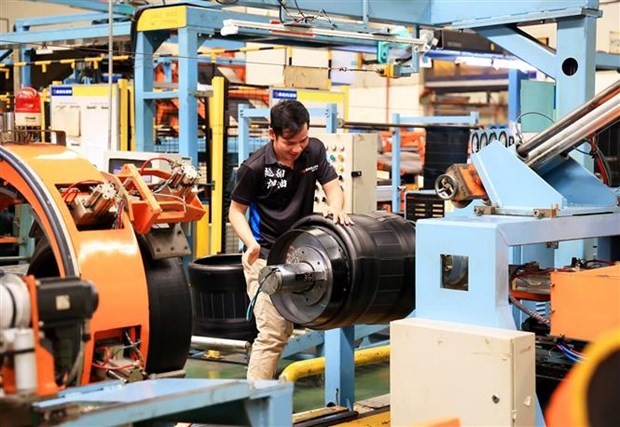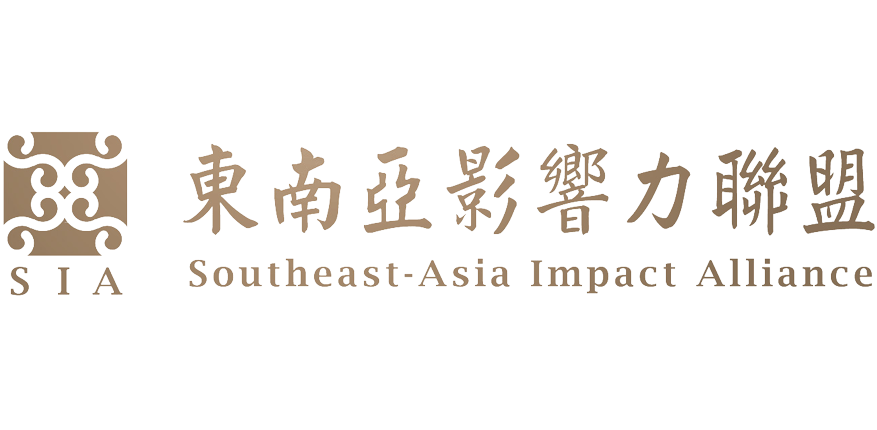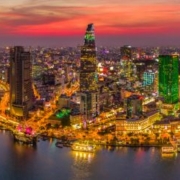US News: Vietnam is becoming a “magnet” for attracting foreign direct investment in Southeast Asia
The CEO of Source of Asia quoted EuroCham’s report as saying, “Another 3% of corporate leaders have ranked Vietnam among their top three preferred investment destinations.”

Workers are laboring at the automobile tire manufacturing plant of Sailun Vietnam Limited Company in Phuoc Dong Industrial Park, Go Dau District, Tay Ninh Province. (Photo: Hồng Đạt/TTXVN).
An investment-friendly environment is helping Vietnam become one of the strongest magnets for foreign direct investment (FDI) in the Southeast Asian region.
This is the observation made by author Simon Littlewood in his article “Vietnam’s Great Expectations,” published in the American magazine Global Finance last week.
According to the author, Vietnam possesses several favorable factors for attracting foreign capital. In addition to its favorable demographics, low labor costs, and a well-trained workforce, Vietnam’s ability to access large markets directly, such as China and ASEAN, is also an advantage.
Thierry Mermet, the CEO of Source of Asia (SOA), a consultancy specializing in companies seeking business opportunities in Vietnam and ASEAN, stated, “The prospects for the business environment in Vietnam in 2023 show promising signs of improvement.”
According to Mr. Mermet, FDI capital into Vietnam reached approximately 10 billion USD in the first quarter of this year, marking a 0.5% increase compared to the same period last year. SOA expects the situation to continue to be favorable. He mentioned, “Companies are eagerly anticipating similar levels of FDI to continue pouring into Vietnam.”
Mr. Mermet emphasized that Vietnam is truly asserting its position as a top destination for European business leaders looking to invest.
Referring to the EuroCham Business Confidence Index report, the CEO of SOA stated, “An additional 3% of business leaders have ranked Vietnam among their top three preferred investment destinations. This is a solid indicator that we are moving in the right direction.”
In the first half of this year, Vietnam attracted investment from 90 countries, with the top 5 being Asian nations. South Korea ranked first with 81 billion USD, Singapore came in second with 72 billion USD, and Japan secured the third position with nearly 70 billion USD in committed capital.

Workers are inspecting finished products at Sankoh Vietnam Limited Company, a 100% Japanese-owned enterprise, located in the Compare Bo Trai Industrial Park, Hoa Binh Province. (Photo: Tuấn Anh/TTXVN).
Mr. Mermet further noted that the Thomson Medical Group, one of Singapore’s largest private healthcare service providers for women and children, is preparing to acquire the FV Hospital in Ho Chi Minh City. This is considered the largest deal in the healthcare sector in Vietnam.
This 381 million USD transaction not only expands Thomson’s presence in the Vietnamese market but also enables the Singaporean provider to “capitalize on the growing medical tourism opportunities in neighboring countries,” according to Mr. Mermet.
According to author Littlewood, another sign of Vietnam’s attractiveness is that VinFast, a recent electric vehicle manufacturer, has become the world’s third-largest automaker by market capitalization, following only the giants Tesla of the United States and Toyota of Japan.
The author quotes Barry Elliott, Vice Chairman of Tomkins Ventures and a well-established supplier in Vietnam, as saying, “With a 20% surge in stock prices, VinFast’s valuation has reached an impressive 191.2 billion USD. This not only signals a promising future for the electric vehicle industry in Southeast Asia but also demonstrates Vietnam’s emerging manufacturing capabilities.”
Vice Chairman Elliott pointed out that since 2020, Vietnam has increasingly become a preferred destination for Japanese businesses as many Japanese companies have been redirecting their manufacturing facilities to the ASEAN region, and this trend is continuing.
The article in Global Finance also acknowledges that the United States is enhancing its economic relations with Vietnam, especially as the leaders of both countries issued a Joint Statement in September elevating their bilateral relationship to a Comprehensive Strategic Partnership during President Joe Biden’s state visit to Vietnam.
The “can-do” spirit
During her recent trip to Ho Chi Minh City, Jacqueline Poh, CEO of the Singapore Economic Development Board, met with startups in the financial services, robotics, and renewable energy sectors. Ms. Poh acknowledged the significant impact of the overseas Vietnamese community returning with deep foreign experiences.
“They all have a ‘can-do’ spirit, support each other, and are courageous. The strong combination of these factors has created a favorable entrepreneurial ecosystem for the locality,” said Ms. Poh.
Carsten Ley, Founder and CEO of Asia PMO, which specializes in advising companies operating in Vietnam, believes that Vietnam is elevating its value chain from products like shoes and textiles to high technology. This includes Vietnamese fintech companies such as payment service providers Momo, ZaloPay, and VNPay, as well as foreign startups.
“Capital expenditure will grow rapidly, reflecting the foreign direct investment of multinational companies and strong domestic infrastructure spending,” Mr. Ley stated.
Refer to the original post here
For additional details, refer to our SIA services | Link



